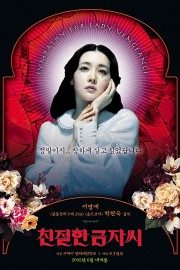Sympathy for Lady Vengeance
“Lady Vengeance” is the third chapter of Park Chan-Wook’s Revenge Trilogy, begun with the South Korean virtuoso’s “Sympathy for Mr. Vengeance” (which first gained recognition when it landed on Harry Knowles’ 10 Best List for 2002) and continued with “Oldboy,” which received a Stateside release last year. “Lady Vengeance” makes the director three-for-three in the trilogy (linked by theme, not characters), with recognition also deserved for his more-conventional debut “Joint Security Area” (good, but interesting) and his contribution to last year’s anthology “Three…Extremes” (which is admittedly a letdown when you see his features). He deserves every ounce of praise he’s received for the films in the trilogy (he’s one of the most exciting talents in contemporary world cinema). With each subsequent film, Park has taken the boundaries of the genre a little further in terms of both content and storytelling (maybe a little too far in “Lady Vengeance”- as riveting as the story is, it’s difficult to follow at times). What keeps them from being exploitive and gratuitous exercises in violence, however, is a bold and sometimes tragic humanity that makes the places Park takes us as a viewer more surprising…and shocking. In “Mr. Vengeance,” it was the unconditional love the brother had for his handicapped sister, even when he took a businessman’s young daughter hostage to get money to help her. In “Oldboy,” it’s the tender love between the man just released after being captive (by an unknown kidnapper) for 15 years and the young woman- who reminds him of his daughter, who would be about the same age as she is- who treats him kindly after his release.
In “Lady Vengeance,” it’s the bond forged by the 30-something year old woman who was just released from prison after years of being held as the murderer of a 5-year old boy (she confessed, but as always with Park, there’s more to it than that) and the young daughter she had to leave behind. The daughter can’t understand how her mother, Lee Geum-Ja (played with startling force and feeling by Lee Yeong-ae), could possibly give her up, but eventually Geum-Ja will be able to tell her through the teacher, Mr. Baek (played by Choi Min-Sik, “Oldboy’s” prisoner), who actually did murder the boy (and others after Geum-Ja was in prison) in a scene of indelible emotion. And we are soon to understand, as well, why they cannot be a part of the other’s lives even after Mr. Baek is brought to justice- a brutal and, honestly, fitting retribution given what the parents- of mixed mind about a punishment at first- were put through. It makes the time mother and daughter are able to share much more important- and potent- for both, linking them forever. It’s an instinctive bond not dissimilar to the one Quentin Tarantino developed in the final section of his “Kill Bill” opus- whose revenge story no doubt found some inspiration in Park’s films (at least “Mr. Vengeance”), among the aknowledged references. Three guesses as to who was probably “Oldboy’s” biggest cheerleader when it won the Grand Prix at Cannes in 2004, when QT headed the judging panel? After watching Park Chan-Wook’s films- especially his latest- it’s not hard to see where QT’s coming from.










